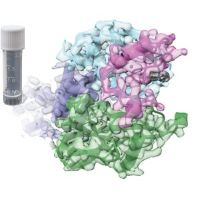Specification
| Description | Recombinant protein from the full-length sequence of homo sapiens sorbitol dehydrogenase (SORD), transcript variant 1 (NM_003104). |
| Organism | Homo sapiens (Human) |
| Expression Host | Human Cells |
| Tag Info | His or DYKDDDDK. Please contact us if you need further information or require specific designed tag. |
| Purity | Greater than 90% by SDS-PAGE gel |
| Uniprot ID | Q00796 |
| Entry Name | DHSO_HUMAN |
| Gene Names | SORD |
| Alternative Gene Names | |
| Alternative Protein Names | Sorbitol dehydrogenase (SDH) (EC 1.1.1.-) ((R,R)-butanediol dehydrogenase) (EC 1.1.1.4) (L-iditol 2-dehydrogenase) (EC 1.1.1.14) (Polyol dehydrogenase) (Ribitol dehydrogenase) (RDH) (EC 1.1.1.56) (Xylitol dehydrogenase) (XDH) (EC 1.1.1.9) |
| Application | Antigens, Western, ELISA and other in vitro binding or in vivo functional assays, and protein-protein interaction studies; For research & development use only! |
| Buffer | Purified protein formulated in a sterile solution of PBS buffer, pH7.2, without any preservatives |
| Endotoxin | Endotoxin level is < 0.1 ng/µg of protein (<1EU /µg) |
| Length | 357 |
| Molecular Weight(Da) | 38325 |
| Protein Sequence | (The sequence of expressed protein may have some variation from the sequence shown below. Please contact us for the exact sequence.) MAAAAKPNNLSLVVHGPGDLRLENYPIPEPGPNEVLLRMHSVGICGSDVHYWEYGRIGNFIVKKPMVLGHEASGTVEKVGSSVKHLKPGDRVAIEPGAPRENDEFCKMGRYNLSPSIFFCATPPDDGNLCRFYKHNAAFCYKLPDNVTFEEGALIEPLSVGIHACRRGGVTLGHKVLVCGAGPIGMVTLLVAKAMGAAQVVVTDLSATRLSKAKEIGADLVLQISKESPQEIARKVEGQLGCKPEVTIECTGAEASIQAGIYATRSGGNLVLVGLGSEMTTVPLLHAAIREVDIKGVFRYCNTWPVAISMLASKSVNVKPLVTHRFPLEKALEAFETFKKGLGLKIMLKCDPSDQNP |
Background
| Function | FUNCTION: Polyol dehydrogenase that catalyzes the reversible NAD(+)-dependent oxidation of various sugar alcohols. Is mostly active with D-sorbitol (D-glucitol), L-threitol, xylitol and ribitol as substrates, leading to the C2-oxidized products D-fructose, L-erythrulose, D-xylulose, and D-ribulose, respectively (PubMed:3365415). Is a key enzyme in the polyol pathway that interconverts glucose and fructose via sorbitol, which constitutes an important alternate route for glucose metabolism. The polyol pathway is believed to be involved in the etiology of diabetic complications, such as diabetic neuropathy and retinopathy, induced by hyperglycemia (PubMed:12962626, PubMed:29966615, PubMed:25105142). May play a role in sperm motility by using sorbitol as an alternative energy source for sperm motility (PubMed:16278369). May have a more general function in the metabolism of secondary alcohols since it also catalyzes the stereospecific oxidation of (2R,3R)-2,3-butanediol. To a lesser extent, can also oxidize L-arabinitol, galactitol and D-mannitol and glycerol in vitro. Oxidizes neither ethanol nor other primary alcohols. Cannot use NADP(+) as the electron acceptor (PubMed:3365415). {ECO:0000269|PubMed:16278369, ECO:0000269|PubMed:3365415, ECO:0000303|PubMed:25105142, ECO:0000303|PubMed:29966615, ECO:0000305|PubMed:12962626}. |
| Pathway | |
| Protein Families | Zinc-containing alcohol dehydrogenase family |
| Tissue Specificity | Expressed in liver (PubMed:3365415). Expressed in kidney and epithelial cells of both benign and malignant prostate tissue. Expressed in epididymis (at protein level). {ECO:0000269|PubMed:16278369, ECO:0000269|PubMed:19423711, ECO:0000269|PubMed:20372835, ECO:0000269|PubMed:3365415}. |
QC Data
| Note | Please contact us for QC Data |
| Product Image (Reference Only) |  |

